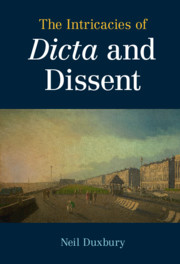When actors express conflicting views about the validity or scope of norms or rules in relation to other norms or rules in the international sphere, they often do so in the language of international law. This contribution argues that international law’s hermeneutic acts as a common language that cuts across spheres of authority and can thus serve as a conflict management tool for interface conflicts. Often, this entails resorting to an international court. While acknowledging that courts cannot provide permanent solutions to the underlying political conflict, I submit that court proceedings are interesting objects of study that promote our understanding of how international legal argument operates as a conflict management device. I distinguish three dimensions of common legal form, using the well-known EC–Hormones case as illustration: a procedural, argumentative, and substantive dimension. While previous scholarship has often focused exclusively on the substantive dimension, I argue that the other two dimensions are equally important. In concluding, I reflect on a possible explanation as to why actors are disposed to resort to international legal argument even if this is unlikely to result in a final solution: there is a specific authority claim attached to international law qua law.
